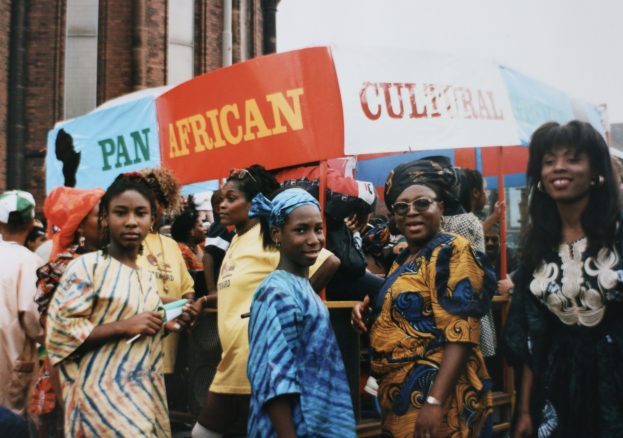
Caribbean Carnival is a vibrant, annual, reminder of the contribution that Caribbean migration has made to Britain. Carnival has become not only a celebration of Caribbean culture, but over the years it has come represent Black British culture, and more recently the cultural diversity in British society, as more and people from outside of the Caribbean community take part in Carnivals across the country. In fact the development of Caribbean Carnival is also the development of multicultural Britain, and British Caribbean Carnival heritage is taking its place in the national story. Often misinterpreted as an excuse for a party, Caribbean Carnival stores the culture and heritage of the Caribbean community.
Although Carnival has a long tradition in the UK, in many areas annual Carnival processions had gone into steep decline by the 1950s and 1960s, a result of the rapid post war social changes. The Caribbean Carnivals which have developed were not simply an extension or replacement of these; the founding Carnival pioneers saw an opportunity for the new Caribbean communities to combat homesickness and respond to the distressing levels of racism and exclusion which were encountered every day, through their masquerading traditions. Carnival became a means of political resistance to this hostile environment in cities across the UK such as Leeds, Derby, Huddersfield and London.
For Arthur France, Ian Charles and the founders of Leeds West Indian Carnival, Carnival was a way for the Caribbean communities to demonstrate to a sceptical city Council and West Midlands Police that a Black led organisation was able to deliver a large outdoor event and had the abilities to make a successful contribution to the city. The Carnival street parade is now the biggest one day street festival in Europe. Derby Caribbean Carnival was begun in 1975 by the members of Derby West Indian Community Association, as a way of promoting community cohesion in the city. Over the past 42 years, this nationally recognised annual event is highly valued by the city. In Notting Hill, the Carnival activities began in response to a racist murder, and took to the streets as an expression Black of resistance.
In British popular culture, Caribbean Carnival has displaced existing Carnival traditions in many areas. Such notable exceptions of surviving traditional English Carnivals such the centuries old Bridgwater Carnival and Southend Carnival, now regularly invite Caribbean Carnival groups to take part in their events. Over the past 50 years, Carnival has come to symbolise Caribbean, Black British, and now multicultural British culture, even to the extent that Clary Sandly’s design was included in the current British passport. Carnival has become an opportunity for everyone to celebrate their culture and masquerading traditions. Bolivians, Brazilian, South Asian and Polish groups have become regular sights in Caribbean Carnivals across the country, and Luton International Carnival and Northampton Carnival actively encourage participation in the procession from communities across the community. In these times of shifting identities and uncertain futures, the ability of Carnival to unify communities will become even more important.
However, Carnival has always had an uneasy relationship with authority, and is becoming increasingly under pressure as traditional routes become gentrified, security and policing becomes more restrictive, and the cultural importance of Carnival becomes increasingly undermined by
commercial exploitation. It is how Carnivalists and the Caribbean community respond to these challenges, which will determine whether Carnival thrives or simply survives in the next 70 years.
But the value and importance of Carnival is beginning to receive wider recognition. Like many other areas of Black history and culture, Carnival is now beginning to attract serious academic attention. Researchers include Emily Zobel Marshall at Leeds Beckett University and my own PhD research into the oral tradition and intangible heritage of Caribbean Carnival. This work builds on that of Ruth Thomsett and Celia Burgess Macey. There is also a growing collection of Carnival archives, including the digital archive at the UK Centre for Carnival Arts, the Ruth Thomsett and Ansel Wong collections at Black Cultural Archives, and the Cy Grant collection at London Metropolitan Archives.
As we celebrate the 70th anniversary of Windrush, we should also celebrate the wonderful contribution that Carnival has made to British culture. Carnival continues to embody the resilience and resistance of the Black community in Britain, whilst remaining a store of Caribbean culture and heritage. British Caribbean Carnival has become a place where we can all belong.
